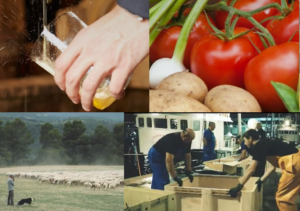 The liberalisation of the European agri-food market and the progressive disintegration of the protectionism of the Common Agricultural Policy is confronting small farmers with a constant crisis, in addition to their lack of logistical infrastructure, know-how or access to capital. In this context, cooperative enterprises have gained special academic and institutional attention as strategic organisations for sustainable economic development and greater social cohesion at the local level. Local agri-food systems also play a relevant role in territorial development plans and academic literature, because they concentrate a large number of actors, connected by a specific geographical space and its characteristics, who cooperate to develop, produce and market products, relying on regional resources. Moreover, with consumers’ increasing interest in local products, the retail sector has internalised that it must compete in partnership with its small local suppliers.
The liberalisation of the European agri-food market and the progressive disintegration of the protectionism of the Common Agricultural Policy is confronting small farmers with a constant crisis, in addition to their lack of logistical infrastructure, know-how or access to capital. In this context, cooperative enterprises have gained special academic and institutional attention as strategic organisations for sustainable economic development and greater social cohesion at the local level. Local agri-food systems also play a relevant role in territorial development plans and academic literature, because they concentrate a large number of actors, connected by a specific geographical space and its characteristics, who cooperate to develop, produce and market products, relying on regional resources. Moreover, with consumers’ increasing interest in local products, the retail sector has internalised that it must compete in partnership with its small local suppliers.
Through a case study based on 22 interviews with actors from different areas of the supply chain and supported by extensive quantitative information from both primary and secondary sources, this paper analyses the inter-cooperation between the public administration, small agricultural producers and the Eroski cooperative retailer in the Basque Country and Navarre to promote a local agri-food system. This study aims to (1) analyse the mechanisms that public and private entities put in place to promote a local agri-food system such as the Basque-Navarre one and the benefits for the parties involved; and (2) identify the conflicts that can arise between the parties in this type of relationship and the key lessons for resolving them.
The study analyses various successful inter-cooperation initiatives between retailers, regional governments and small local suppliers to enhance, promote and market local products. For small local suppliers, these initiatives have resulted in sustained and significant growth in sales, reduced sensitivity to market fluctuations, professionalisation (homogeneity, quality, safety, logistics, financial capacity) and consolidation of territorially-based agricultural structures, especially agricultural cooperatives.
It is preferable for local agri-food system governments to prioritise agreements with retailers to indirectly stimulate production, rather than direct subsidies. Thanks to its extensive knowledge of consumption trends and its oligopolistic power, distribution has the capacity to boost supply by increasing demand. The two-tier traction technique is worth mentioning, which consists of achieving sectoral growth together with the dominant small local supplier and then supporting the more micro suppliers who join this sectoral growth.
The focus on local products and the development of local agri-food systems entails additional costs for the retailer, but it also links their brand to concepts such as health or sustainability and allows small local suppliers to improve their economies of scale, which can lead to lower prices for local products and a consequent increase in their consumer base.
A problem of cultural alignment (tools, processes, language, needs) between the parties is identified. Both retailers and small local suppliers should develop initiatives to align their organisational cultures, with the support offered by different public institutions and producer associations. One measure that facilitates this alignment and smooth communication is for small local suppliers to hire managers with previous retail experience and vice versa.
High levels of dependence are also identified on the part of some small local suppliers who concentrate more than 50% of their turnover in Eroski and who see their capacity for diversification limited due to “misgivings” on the part of the retailer. Conflicts in the relationship arising from this could be smoothed out by a more strategic approach, with joint discussions on growth targets or even the signing of long-term supply contracts. In addition, quality certification seals could improve the inherently low power position of small local suppliers by increasing their attractiveness to other retailers and the buyer’s switching cost.
We observe that retailers prefer to cooperate with small local suppliers working in partnership, as a cooperative, or under quality certificates. Although this may imply a decrease in their bargaining power, it allows the retailer to broaden the impact of their initiatives and to further develop the local agri-food system. These producers who partner to inter-cooperate with retailers share knowledge and resources to make greater investments and create joint activities; they strengthen their willingness to work with higher quality standards and achieve greater professionalisation and alignment of organisational cultures with retailers.
This work provides data and perceptions provided by the retail sector, which allow for a novel and unconventional analysis, given the difficulty of accessing them on a regular basis. The conclusions drawn from this experience can serve as a lesson for large supermarkets operating in regions with weak agri-food systems that, driven by consumer trends, want to give prominence to their local positioning as a differentiation strategy; for small local suppliers who want to sustainably expand the sale of their products to large supermarkets; and for governments and public institutions seeking to implement public policies for the territorial development of their local agri-food systems.
Read full article.
How to cite this article: Santos-Larrazabal, J. & Basterretxea, I. (2023). Close to me. Intercooperation between Cooperative Retailers, Local Food Suppliers and Public Institutions to boost Regional Agrifood Systems. The case of Eroski. CIRIEC-España, revista de economía pública, social y cooperativa, (109), 65-97.

Deje una respuesta